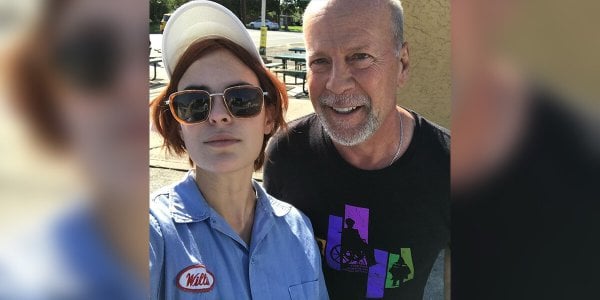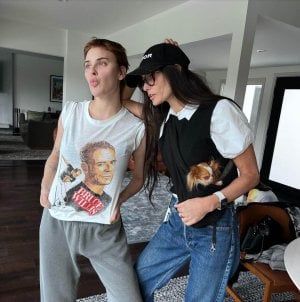Heartbreaking: Bruce Willis' early dementia warning signs before diagnosis revealed by his daughter Tallulah
- Replies 5
Content warning: This article mentions eating disorders which could be triggering to some readers. Discretion is advised.
Age-related problems, such as dementia, affect many Australians, and it reminds us all that our bodies and minds don't always work as well as we'd like them to.
However, it's often a reality that you only realise the extent of the issue once it's too late, as is the case with Hollywood legend Bruce Willis.
In February, news regarding the beloved actor Bruce Willis’ diagnosis with frontotemporal dementia (FTD) stirred a conversation about this disease and how it impacted his family before being diagnosed. You can read more details about this story here.
Bruce Willis has touched our hearts in many remarkable movie roles, one of which is the fearless hero in Die Hard.
Sadly, his 29-year-old daughter Tallulah Willis has shared her family's emotional journey with dementia, from the early warning signs they missed to grappling with the difficult diagnosis.
FTD is known to cause memory loss, language problems, and difficulty performing daily tasks. This type of dementia is different from Alzheimer's disease, as its early symptoms are more likely to involve issues with language and motor skills rather than memory loss.
In an interview with Vogue, Tallulah narrated her father’s FTD symptoms, which inadvertently intertwined with her own health struggles, including anorexia nervosa and depression.
Bruce's gradual decline in responsiveness was their first clue that something was amiss, but they initially brushed it off as hearing loss.
One of three daughters he shares with ex-wife Demi Moore, Tallulah harboured feelings of guilt and personal blame when her father began to become less responsive.
‘He had had two babies with my stepmother, Emma Heming Willis, and I thought he’d lost interest in me,’ she said. In retrospect, she admits that she retreated into her issues and was in denial about the true cause behind her father's changes.
It wasn't until she attended a wedding in the summer of 2021 that she came to the heart-wrenching realisation that her father would likely never be able to give a speech at her wedding.
‘Suddenly, I realised that I would never get that moment, my dad speaking about me in adulthood at my wedding,’ she tearfully admitted.
‘It was devastating.’
Like many families impacted by dementia, which affects over half a million Australians, Tallulah is navigating her way through an early grieving process.
‘In the past, I was so afraid of being destroyed by sadness, but finally, I feel that I can show up and be relied upon,’ she shared.
‘I can savour that time, hold my dad’s hand, and feel that it’s wonderful.’
Despite the grieving, Tallulah cherishes time spent with her father and urges others in a similar situation to do the same.
She said she now captures memories of their moments together by taking a lot of photos and even saving voicemails to reflect on later.
‘I find that I’m trying to document, to build a record for the day when he isn’t there, to remind me of him and of us,’ she said.
‘I have every voicemail from him saved on a hard drive.’
Bruce Willis’ experience with dementia serves as a powerful reminder of the importance of early detection and intervention when signs of cognitive decline first appear.
While the diagnosis can change the lives of all involved, there is still much love and support to be found in the form of family, friends, and community resources.
For our Senior Discount Club members and readers, if you or someone you know is impacted by dementia, don't hesitate to seek professional help and access resources from organisations like Dementia Australia and Alzheimer’s Association.
Let’s keep Bruce Willis and his family in our thoughts and prayers as they face the challenges ahead.
 For anyone going through the same experience, know that we’re also thinking of you in these trying times. Please feel free to share your experiences, thoughts, or advice with anyone battling the same illness in the comments below.
For anyone going through the same experience, know that we’re also thinking of you in these trying times. Please feel free to share your experiences, thoughts, or advice with anyone battling the same illness in the comments below.
Age-related problems, such as dementia, affect many Australians, and it reminds us all that our bodies and minds don't always work as well as we'd like them to.
However, it's often a reality that you only realise the extent of the issue once it's too late, as is the case with Hollywood legend Bruce Willis.
In February, news regarding the beloved actor Bruce Willis’ diagnosis with frontotemporal dementia (FTD) stirred a conversation about this disease and how it impacted his family before being diagnosed. You can read more details about this story here.
Bruce Willis has touched our hearts in many remarkable movie roles, one of which is the fearless hero in Die Hard.
Sadly, his 29-year-old daughter Tallulah Willis has shared her family's emotional journey with dementia, from the early warning signs they missed to grappling with the difficult diagnosis.
FTD is known to cause memory loss, language problems, and difficulty performing daily tasks. This type of dementia is different from Alzheimer's disease, as its early symptoms are more likely to involve issues with language and motor skills rather than memory loss.
In an interview with Vogue, Tallulah narrated her father’s FTD symptoms, which inadvertently intertwined with her own health struggles, including anorexia nervosa and depression.
Bruce's gradual decline in responsiveness was their first clue that something was amiss, but they initially brushed it off as hearing loss.
One of three daughters he shares with ex-wife Demi Moore, Tallulah harboured feelings of guilt and personal blame when her father began to become less responsive.
‘He had had two babies with my stepmother, Emma Heming Willis, and I thought he’d lost interest in me,’ she said. In retrospect, she admits that she retreated into her issues and was in denial about the true cause behind her father's changes.
It wasn't until she attended a wedding in the summer of 2021 that she came to the heart-wrenching realisation that her father would likely never be able to give a speech at her wedding.
‘Suddenly, I realised that I would never get that moment, my dad speaking about me in adulthood at my wedding,’ she tearfully admitted.
‘It was devastating.’
Like many families impacted by dementia, which affects over half a million Australians, Tallulah is navigating her way through an early grieving process.
‘In the past, I was so afraid of being destroyed by sadness, but finally, I feel that I can show up and be relied upon,’ she shared.
‘I can savour that time, hold my dad’s hand, and feel that it’s wonderful.’
Despite the grieving, Tallulah cherishes time spent with her father and urges others in a similar situation to do the same.
She said she now captures memories of their moments together by taking a lot of photos and even saving voicemails to reflect on later.
‘I find that I’m trying to document, to build a record for the day when he isn’t there, to remind me of him and of us,’ she said.
‘I have every voicemail from him saved on a hard drive.’
Bruce Willis’ experience with dementia serves as a powerful reminder of the importance of early detection and intervention when signs of cognitive decline first appear.
While the diagnosis can change the lives of all involved, there is still much love and support to be found in the form of family, friends, and community resources.
For our Senior Discount Club members and readers, if you or someone you know is impacted by dementia, don't hesitate to seek professional help and access resources from organisations like Dementia Australia and Alzheimer’s Association.
Let’s keep Bruce Willis and his family in our thoughts and prayers as they face the challenges ahead.
Key Takeaways
- Tallulah Willis, the 29-year-old daughter of Hollywood actor Bruce Willis, has opened up about the early warning signs the family missed ahead of the star’s dementia diagnosis.
- Bruce Willis was diagnosed with frontotemporal dementia (FTD) in February, which can result in problems with memory loss, language use, and the ability to perform everyday functions.
- In an interview with reporters, Tallulah detailed some of her father’s early symptoms, including a vague unresponsiveness that the family initially attributed to hearing loss.
- Tallulah explained that she's now taking tons of photos of her father and saving all his voicemails while also learning to come to terms with his FTD diagnosis and preparing for the grieving process.









